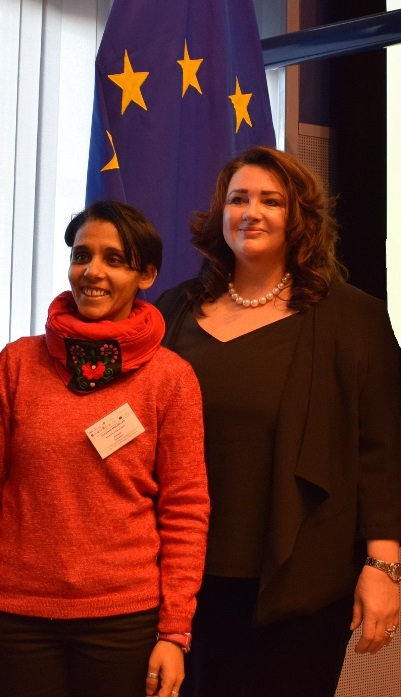“‘Institutional care’ is a contradiction in terms. No institutional care is better than community-based care, family care, or personal care.” This is what European Commissioner for Equality Helena Dalli said yesterday at the “Towards inclusion” conference, organised by the European Expert Group on the Transition from Institutional to Community-based Care (EEG) and attended by more than 200 invited participants. She added that “unfortunately, many people still think institutions are safe places. They believe that they protect children or people with disabilities, especially people with intellectual disabilities, from the outside world. But this is simply not true. People have a right to, and enjoy, living independently and in a community – it is where they truly flourish.”
In her speech, Dalli confirmed that there will be a new European Disability Strategy for the post-2020 period (► watch a video on Inclusion Europe’s demands for the new strategy). Inclusion Europe republished Dalli’s full speech in English and translated it into French, Spanish, Italian, German and Czech.
Helena Dalli’s words were echoed by another conference speaker: Elisabeta Moldovan, steering group member of the European Platform of Self-Advocates, who grew up in institutions and only managed to leave after 25 years. During her speech, Elisabeta Moldovan talked about the memories she has from living in an institution: “I was moved from orphanage to orphanage, without any right to refuse. I worked for the employees. Instead of money, I received a few cigarettes and a piece of bacon after a hard day’s work. I was sedated for disobedience. As punishment, I had my hair cut off and was thrown into the basement.”
She explained how her life in the community has changed her: “At first, I was scared, I didn’t trust people around me and I didn’t believe in myself. I started learning with the help of my friends and the people who believed in me and supported me.” In conclusion, Elisabeta Moldovan stated:
We need a strong commitment for deinstitutionalisation. In an institution, you cannot develop. Everyone has the right to live in the community, regardless of their disability, mental health issues or other types of issues. It is unacceptable if families are the only ones providing support!
Inclusion Europe’s Director Milan Šveřepa, who served as a co-chair of the EEG for two-and-a-half years, also spoke at the event. He pointed out that “many people have benefitted from the efforts on deinstitutionalisation in the last 10 years. But millions are still living in institutions or are in danger of being institutionalised. And we must not forget that deinstitutionalisation means that people should be fully included in the community. This means structural changes.” In order to achieve this,
- no more money should be put into institutions, but into the people and community-based support instead
- the ones concerned should be involved in the deinstitutionalisation process and
- deinstitutionalisation should be accompanied with measures for housing, affordable healthcare, access to quality education etc.

Andriana Sukova, Deputy Director-General at the European Commission’s Directorate-General for Employment, Social Affairs and Inclusion, pointed out how the EU is pushing for these changes, for example through the European Pillar of Social Rights. She also stressed that “deinstitutionalisation is a process that needs to be tackled at European, national, regional and local level” and that it should be carefully monitored.
At the conference, which received funding from the European Commission, the EEG published a joint statement on what needs to be done by the EU to drive deinstitutionalisation forward.
Further reading
Learn about Inclusion Europe’s work on deinstitutionalisation
Read our articles about the topic
More information about Elisabeta Moldovan





